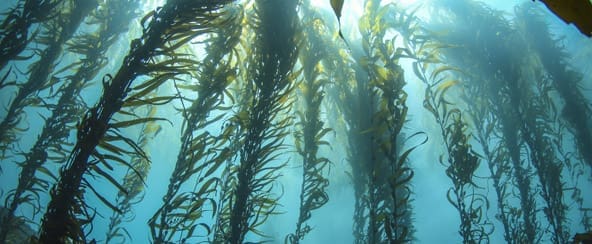Remove
Advancing Ocean-Based Pathways for Cleaning Up Carbon Pollution
The biggest threat to the long-term health of the ocean comes from the build-up of greenhouse gas pollution in the atmosphere, which drives excess heat and acidity into the ocean.
We can address this only by reducing overall greenhouse gas concentrations in the biosphere, which necessarily includes both reducing emissions and cleaning up billions of tons of the carbon dioxide pollution already in the air and water.
There are many potentially viable ways to clean up carbon pollution—including pathways that harness the natural power of the ocean. Ocean Visions is working to advance the responsible research and development of all possible pathways to determine which ocean-based climate solutions might be safe, equitable, and viable.
Our initiatives include:
Accelerating Innovation

Innovation Road Maps
In order to advance our collective development of viable possibilities, Ocean Visions, working with experts from around the globe, developed a series of road maps that assess the current stage of various technologies, identify obstacles to development, and outline first-order priorities for advancing the field. We regularly update these road maps and catalyze intellectual and financial resources towards a number of identified priorities.

Launchpad
As part of our continued efforts to support innovation and testing of possible solutions, Ocean Visions provides tailored expert support to selected innovators through the Ocean Visions Launchpad by building customized advisory teams, selected from our Network where possible. These expert teams help companies test and validate their technologies and business models in order to improve their chances of success.
Supporting Critical Research & Development

mCDR Ecosystem Database
To support collaboration and innovation in the growing marine carbon dioxide removal (mCDR) field, Ocean Visions has developed an mCDR Ecosystem Database —an updated and expanded version of an mCDR Ecosystem Map originally built by [C]Worthy and transferred to Ocean Visions. This comprehensive resource connects stakeholders across research, government, NGOs, and the private sector, fostering transparency and knowledge-sharing. Explore the database to stay informed, connect with key players, and drive the responsible development of mCDR solutions.

Creating a Framework to Guide Research on Seaweed-Based Carbon Dioxide Removal
Growing and sinking seaweed in the deep ocean has received widespread attention as a potential strategy to sequester carbon dioxide, but there is a lack of information needed to assess the technology’s effectiveness and environmental impacts. Together with Monterey Bay Aquarium Research Institute, Ocean Visions released a report outlining the comprehensive research framework needed to determine the efficacy and impacts of cultivating and sinking seaweed to sequester carbon. We are now working to bring the report to the attention of governments and to identify sources of support that can fund needed research.

Ocean Iron Fertilization Site Suitability Planning Tool
After nearly 30 years of scientific investigation, estimates of the potential for ocean iron fertilization (OIF) to contribute to carbon dioxide removal remain inconclusive. Ocean Visions’ site suitability planning tool, created in collaboration with Esri, offers researchers a multidimensional and holistic picture of possible locations for OIF field trials that would help answer the remaining critical scientific questions regarding durability of carbon sequestration and associated environmental impacts.

mCDR Field Trial Database
Field trials are critical to improving our understanding of the potential efficacy and impacts of marine carbon dioxide removal (mCDR) at scales that matter to address the climate crisis. To increase awareness of the state of development and improve knowledge-sharing across the ocean-climate community, Ocean Visions has built a database of mCDR field trials. The first of its kind, the tool includes information on the different mCDR pathways being tested, details about carbon dioxide sequestration, Monitoring, Reporting, and Verification strategies, and lessons learned.

Working Group on advancing research for a Global multi-scale Ocean Carbon Observatory (GOCO)
This working group brings together institutions united by a shared long-term vision to establish an operational, multi-scale Global Ocean Carbon Observatory (GOCO). This observatory aims to play a pivotal role in tracking carbon dynamics, supporting the monitoring, reporting, and verification of carbon across various scales, understanding the impacts of natural and human-induced changes on ocean ecosystems, and fostering new scientific discoveries.

Open Ocean Phytoplankton: Exploring a Potentially Important Ocean-Climate Solution
The best available science indicates that phytoplankton-based carbon dioxide removal in the open ocean may be an important part of the solution, yet many questions remain about the potential benefits and risks of these approaches for the ocean, climate, and people. Getting answers to outstanding questions is critical, and a rigorous, transparent, and comprehensive research agenda is the next step toward getting these answers. The Phytoplankton Carbon Solutions project – led by scientists and conservation experts and closely guided by international perspectives that include oceanography, conservation, climate sciences, chemistry, and social sciences – will identify key knowledge gaps and create a design for a RD&D effort to answer the critical remaining questions about phytoplankton-based mCDR approaches.

Environmental Impact Assessment Framework (EIAF) for marine carbon dioxide removal (mCDR)
Ocean Visions is spearheading the development of a comprehensive Environmental Impact Assessment Framework (EIAF) for marine carbon dioxide removal (mCDR). mCDR approaches hold great promise as a climate solution—if they can be proven to be safe, effective, and equitable. One needed tool is a standardized way to assess the potential impacts of the field trials necessary for improving our understanding. We’re addressing this gap by facilitating the creation of the first-ever mCDR EIAF. Once built, this tool will help researchers, regulators, and stakeholders assess the risks, benefits, and ecological impacts of emerging mCDR approaches in order to minimize negative impacts and empower local communities as decisionmakers.
Building Supportive Frameworks To Advance Ocean-Based Climate Solutions

Enabling Governance Frameworks
The development of effective governance frameworks is a key need in advancing responsible research. With funding support from Ocean Visions, The Sabin Center for Climate Change Law at Columbia University developed model federal legislation to advance safe and responsible ocean-based carbon dioxide removal research in U.S. waters.

Shifting the Narrative
One of the critical obstacles to moving solutions-oriented research and testing forward quickly is a lack of support among key influencers. Ocean Visions conducted social-change public opinion research to better understand how opinion leaders are forming their beliefs around the field of ocean-based carbon dioxide removal. In addition to audience research, Ocean Visions is increasing its visibility at international gatherings, from the UN Ocean Conference, to COP, to Climate Week and many stops in between to ensure ocean-based climate solutions is getting full consideration. We're also creating and making available a host of mCDR resources for the entire ocean-climate community to utilize.


